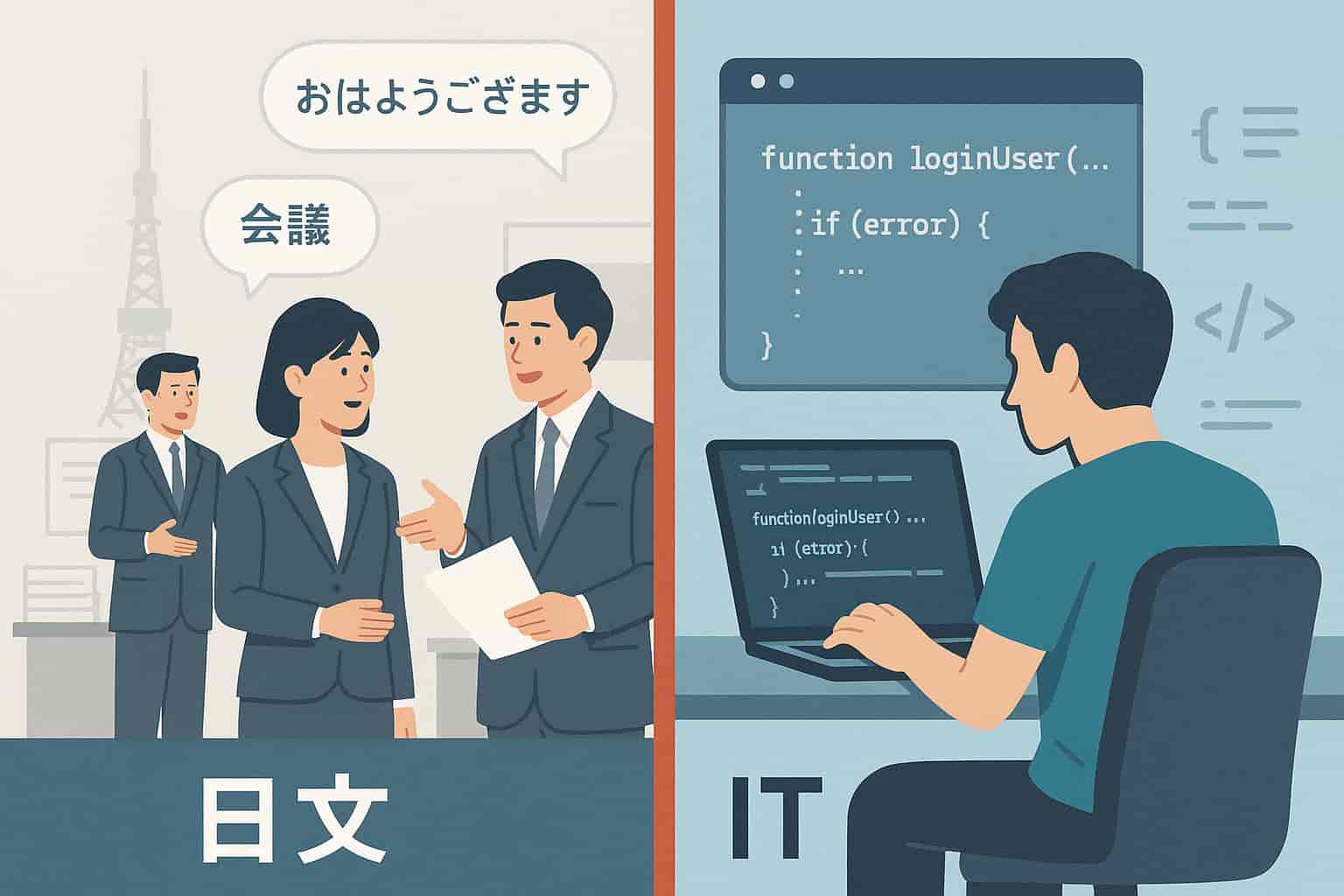Practical Guide to Landing IT Jobs in Japan Without Japanese Skills
Landing a job in Japan is often considered a huge challenge, especially for foreigners without Japanese language skills. Japan places immense importance on its native language, and unlike some other global job markets, fluency in English alone rarely opens doors. That’s why many newcomers feel that mastering Japanese is the only way forward. While this is true in most industries, the IT sector offers a unique path: your coding and technical skills can sometimes speak louder than your language ability.

This post does not encourage you to skip learning Japanese. In fact, I strongly recommend you learn the language to enjoy a smoother, more comfortable life in Japan inside and outside the office. Instead, the purpose of this guide is to show you that it’s entirely possible to land IT jobs without Japanese skills, especially if you focus on programming and other highly technical roles. Based on both research and real experiences, we’ll explore how to showcase your abilities, find opportunities, and grow your career in Japan even when your Japanese is at a beginner level or nonexistent.
Why Japanese Matters and Why IT Is Different
In most industries in Japan, speaking Japanese is considered an absolute requirement. From job applications to interviews, daily meetings, and even casual office communication, companies expect employees to operate in Japanese. Unlike global business hubs such as Singapore or Hong Kong where English is widely accepted, Japan continues to prioritize its own language in almost every professional setting. For foreigners, this often becomes the biggest roadblock regardless of how talented or experienced they may be.

However, the IT industry is a unique exception. Coding languages, frameworks, documentation, libraries, and even error messages are all in English. Whether you are writing a PHP backend, building a Python machine learning model, or debugging a React front-end, you are already working in English every single day. This means that your ability to code, problem Japan who , and deliver results matters far more than your ability to speak perfect Japanese.
In fact, it’s not unusual for foreign programmers in Japan who may not know a single word of Japanese to earn higher salaries than foreigners working in other industries, even those with advanced Japanese language skills such as JLPT N1. A skilled developer with a strong portfolio can command ¥5M–¥10M+ per year, while a foreigner in hospitality, retail, or even translation (despite excellent Japanese fluency) may earn less than half of that. This pay gap highlights how much value Japanese companies place on technical skills in IT compared to pure language ability.
Put simply: your code speaks louder than your Japanese. While learning the language will certainly help you integrate better into daily life and future career growth, it is not a barrier to entry in the IT field. This is why so many foreigners, myself included have been able to start careers in Japan with zero Japanese ability but solid technical knowledge.
Two Paths to Landing an IT Job in Japan
For most foreigners who want to work in Japan, the road usually splits into two very different paths. Understanding these paths is important because they determine the kind of preparation, mindset, and opportunities you’ll have.
- The Traditional Path: This is the route most people imagine when thinking about careers in Japan. It requires learning Japanese to at least JLPT N2 level, practicing Japanese-style interviews (with strict etiquette, bowing, and honorific language), and applying for jobs almost the same way a Japanese graduate would. While this path gives you access to a wide range of industries, it can take years of language study and cultural adjustment before you feel ready to compete.
- The Practical IT Path: This is the alternative, and it’s often overlooked. Instead of waiting until your Japanese is strong, you focus on what you already bring to the table your technical expertise. Japan’s IT sector is facing a shortage of skilled engineers, which means companies are often willing to hire foreigners based on their coding skills, project experience, and portfolio even if their Japanese ability is close to zero. For many developers, this is a much faster and more practical way into the Japanese job market.
Why IT Companies Value Skills Over Language
In IT, results matter more than words. If you can fix bugs, optimize a database, or build a scalable web application, those contributions directly impact a company’s success. Managers know that clean code, reliable systems, and innovative solutions are what keep the business running not just polite keigo (formal Japanese).
Many Japanese companies even the more traditional ones are slowly realizing they can’t compete globally without welcoming international talent. Some have already shifted their team culture to English-friendly environments, especially in tech teams. And in multinational companies, English is often the working language for the entire engineering department. This shift means that as a skilled foreign developer, you can often bypass the language barrier and prove your worth through your portfolio and technical interviews.
Put simply: while most industries in Japan still see Japanese as the gatekeeper, IT is one of the few sectors where your skills can open the door faster than your language ability.
Preparing Yourself: Skills, Portfolio, and Mindset
Whether you are already in Japan for study or work, or you’re planning to come in the near future, the way you prepare will decide how attractive you look to employers. Since you don’t have the advantage of Japanese language skills, your technical ability and presentation must do all the talking for you. Think of this step as creating an online portfolio that showcases your skills more effectively than words.

Showcase Your Work with a Portfolio
If you can’t express yourself fluently in Japanese, your portfolio becomes your voice. A strong personal website or a well maintained GitHub repository is often more powerful than any resume. Employers want to see what you can actually do, not just a list of technologies you claim to know.
Your portfolio should include real, working examples of your projects:
- A web application you designed and deployed
- A mobile app with a clear purpose and documentation
- Contributions to open-source projects that show teamwork and collaboration
- Case studies of how you solved a problem, even if it was part of your university or personal projects
The more practical and “ready-to-use” your projects look, the easier it is for employers to imagine you doing the same for their company. A portfolio is your chance to prove competence without needing perfect Japanese.
Specialize in One Area First
Many beginners make the mistake of trying to learn everything at once,PHP today, React tomorrow, and maybe Python next week. While being a generalist has some value, Japanese companies usually look for problem solvers in a specific area. They want to know you can come in and add value immediately.
Instead of being “average” in many technologies, become excellent in one. If you are a PHP developer, make sure you can build and secure production ready systems. If you love Python, build strong projects in data science, automation, or web frameworks like Django. Once you establish yourself as an expert in one field, you can expand into other languages and frameworks later.
Remember: depth beats breadth when you’re competing in a foreign job market without language skills. Specialization is what convinces a company to take a chance on you.
Mindset: Persistence Is Key
Applying for jobs in Japan without Japanese ability is not easy. You might apply for dozens of Jobs but hear nothing back. You might get invited to interviews, perform well on technical tests, and still be rejected because of cultural fit or communication barriers. This is normal—and it happens even to Japanese applicants.
The key is to treat every rejection as part of the process. Each interview teaches you something new, whether it’s about technical questions, Japanese corporate culture, or how to present your skills more clearly. Over time, your applications will improve, your confidence will grow, and your chances of success will rise.
As one famous line from the movie 3 Idiots says: “Chase excellence, and success will come looking for you.” This mindset fits perfectly in Japan’s IT industry. Focus on improving your coding, building meaningful projects, and mastering your craft. When your skills shine, opportunities will naturally follow.
Persistence is your superpower. If you keep learning, keep applying, and keep building, you will eventually find the right opportunity. Remember, the Japanese IT market needs skilled developers more than ever, you are not asking for charity, you are offering real value.
Where to Find IT Jobs Without Japanese
Searching for IT jobs in Japan can feel overwhelming at first, but the good news is that there are plenty of platforms and strategies that work, even for foreigners without Japanese skills. The key is not just where you search, but also how you present yourself when applying. Let’s look at some effective ways to get started.
Use Global and Japan-Specific Job Portals
Many international companies and Japanese startups post their openings on well-known job portals. For example, job portals for foreigners in Japan can connect you directly to IT-related opportunities where English is acceptable.

Apply Directly on Company Websites
Don’t limit yourself to job boards. Many IT companies in Japan post their openings only on their own websites—sometimes in English, sometimes in Japanese. If you already know which tech stack you want to work with (for example, PHP, Python, or AI), try searching for companies in Japan that specialize in those fields. Once you find them, check the “Careers” or “Recruit” section of their website and apply directly. Even if the page is in Japanese, you can often apply with an English resume if the role itself is technical.
Cold Emails and Networking
One of the most underrated methods is simply reaching out. If you find a company that excites you but doesn’t list any current openings, send a professional email to the HR department or even directly to a tech lead. Introduce yourself, highlight your portfolio, and explain briefly how your skills can help their team. Japanese companies respect initiative, and sometimes opportunities appear when you take the first step.
Networking also plays a big role. Attending local tech meetups or connecting with professionals on LinkedIn can lead to hidden opportunities. Many foreigners who now work in Japan’s IT sector got their first break through personal introductions rather than job ads.
Different Scenarios: Students vs Experienced Professionals
If You Already Have IT Experience Abroad
Coming to Japan with prior IT work experience gives you a clear advantage. If you’ve already worked on real world projects, managed systems, or developed software in your home country, you’re not starting from zero—you already have proof that you can deliver results in a professional environment.
Many foreigners make the mistake of waiting until they finish their degree or language studies in Japan before they start applying. But in reality, companies often value practical experience more than academic qualifications. If you can show a strong track record, solid projects, and clear achievements, there’s no reason to delay. You may even secure a full-time role while you’re still studying, giving you a head start in your career and financial stability much earlier.
The key here is to highlight your past projects and responsibilities in a way that Japanese recruiters can easily understand. Use your resume (rirekisho) to outline your career clearly, and pair it with a portfolio that visually demonstrates your skills. This combination makes it easier for hiring managers to trust your ability, even without Japanese fluency.
If You’re a Student Without Experience
Starting your journey as a student without prior work experience can feel intimidating, but this is also an incredible opportunity to build yourself up from scratch. The good news is that in IT, projects often matter more than formal job titles. If you can show initiative through personal or academic projects, employers will take notice.
Begin by treating your GitHub or personal website as your “living resume.” Upload code, share documentation, and showcase even small projects—like a to-do list app, a blog system, or a data visualization dashboard. As these projects grow in quality, your portfolio becomes a powerful story of your progress and dedication.
By the time you graduate, having 3–5 strong, well-presented projects can set you apart from many other candidates. Companies in Japan are looking for potential, not perfection, and your projects prove that you’re serious about your career. Even if you fail interviews in the beginning, every attempt builds confidence and helps you refine your approach. What matters most is that you never give hope and keep moving forward.
Remember, everyone starts somewhere. As a student, your strength lies in curiosity, persistence, and the ability to learn quickly. Combine that with a visible portfolio, and you’ll be ready to compete in Japan’s IT job market sooner than you think.
How Programming Removes the Language Barrier in Japan
One of the biggest advantages of working in IT is that programming itself is universal. Code doesn’t care about your nationality or your spoken language, it runs the same way in Tokyo as it does in New York or Bangalore. This makes the IT industry in Japan far more accessible to foreigners compared to fields like sales, customer service, or administration, where fluency in Japanese is non-negotiable.
Whether you are writing new features, debugging errors, or integrating third-party APIs, English dominates every part of the workflow. Libraries, frameworks, documentation, GitHub repositories, Stack Overflow discussions all of them are primarily written in English. Even the tools that Japanese developers use daily, such as Visual Studio Code or Docker, operate in English by default.

A simple but powerful example is error handling. When you run into a bug in your project, the error message will almost always appear in English. A Japanese engineer has to do the same thing you do: copy the error, paste it into Google, and look for solutions in English forums or documentation. In this sense, you and your Japanese colleagues are on the same playing field, regardless of your spoken language level.
This shared dependency on English means that your technical ability often matters more than your Japanese ability in the IT field. If you can solve problems quickly, deliver clean code, and work well in a team, you will be respected—even if you can’t yet hold a long conversation in Japanese. In fact, many foreign developers in Japan find themselves earning higher salaries than foreigners in other industries, simply because their coding skills are so valuable and not easily replaced.
Of course, learning Japanese will always help you in the long run especially for meetings, documentation, and daily life. But at the technical level, programming removes much of the language barrier that blocks foreigners in other industries. This is why IT is often the fastest path for foreigners to build a career in Japan, even from zero Japanese ability.
Challenges You Will Face
- Cultural differences: Interview etiquette, hierarchy, and teamwork expectations can be unfamiliar.
- Communication barriers: Meetings may still be held in Japanese even if coding is in English.
- Visa requirements: Ensure you qualify for a work visa, usually requiring a degree or significant work experience.
- Competition: Some companies still prefer bilingual candidates even if English is enough for the role.
Keys to Success
- Build a professional portfolio website or GitHub profile.
- Specialize in one language or framework and demonstrate mastery.
- Apply widely—through portals, LinkedIn, and direct company applications.
- Stay persistent despite rejections.
- Continue learning Japanese for daily life and future promotions.
Conclusion
Getting an IT job in Japan without Japanese is challenging—but far from impossible. Your technical skills, portfolio, and persistence can open doors, even when language feels like a wall. Remember: programming is the same everywhere. If you can code, build, and solve problems, you already hold the most important key. Japanese fluency will improve your life and career in the long run, but it’s not an absolute barrier to entering the IT world.
Stay confident, keep learning, and take your first step today. The Japanese IT industry needs skilled developers and your skills might be exactly what they’re searching for.